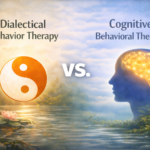Understanding the Root Causes of Insecurity in Relationships
You get into a relationship and it feels great! You then start to wonder if there are any red flags because maybe it seems “too great.” You start to become hyper aware of your partner’s actions and who they are spending time with. You ask them to tell you exactly where they are and who they are hanging out with at all times. Your partner starts becoming frustrated with your behavior. Is it wrong to feel and act this way?
You are not alone in these feelings of insecurity. Insecurities can creep up as negative thoughts that can make you feel uncertain about yourself and/or a situation. These feelings can then cause you to feel anxious, raw and vulnerable and even negatively affect your relationship. Insecurity in relationships is something we all go through so what are the root causes for these experiences and how do we feel more secure in our relationships?
Identifying and Addressing Triggers That Cause You To Feel Insecure in Your Relationships
What are triggers? Triggers can be anything that can cause us to feel emotional and reactive and can include certain events, thoughts, memories and sensations that evoke feelings. In the context of a romantic relationship, triggers can take many forms.
Verbal triggers could be something that your partner is saying or not saying. Physical triggers can be related to types of physical contact or lack thereof. Emotional/psychological triggers can be the way your partner is making you feel. Additionally, there can also be similar triggers activated by your own past that could invoke certain emotions.
What causes triggers? Everyone’s triggers are unique and they can stem from a multitude of factors including previous negative experiences, esteem issues and attachment styles.
When you think about your own relationship, what are the specific issues that make you feel insecure? Are there certain triggers that activate these issues? Perhaps you had a previous partner be unfaithful to you; do you feel anxious whenever your current partner goes to a social setting without you? Your current partner has done nothing to make you question their trust, yet you still feel anxious.
Identifying the root of your own triggers can help you figure out if your alarm system is going off of your own anxiety or if your partner is actually doing something alarming.
How do you know what your triggers are? A good place to start is to notice whenever you feel insecure or activated and to keep a record of those times. You can ask yourself why you feel the way you feel and when/why it started. Awareness is key.
Once you identify and understand your triggers, you are taking steps to overcome relationship insecurity. It is important to be introspective and reflective of your own triggers and it is equally important to have a conversation with your partner about what your triggers are and how you feel when they are activated. Talking to one another about triggers can normalize them and even help you connect with your partner on a deeper level. The eventual goal would be for you and your partner to be aware of one another’s triggers and to move towards a more secure relationship with a deeper understanding of one another.
Cultivating Trust and Security: The First Step to Feeling Secure in Your Relationships
How do you cultivate trust and security in your relationship? After identifying your triggers and having an honest conversation with your partner about them, the work towards a healthy relationship continues.
Do you and your partner have a complete understanding of one another’s triggers and insecurities? Have you both made a commitment to continue to work towards a secure relationship?
Constant communication and check ins are key. Have a conversation with your partner regarding what type of communication frequency and style works best. Does it feel better to check in at a certain time of the day? What are both you and your partner comfortable with?
From time to time, triggers may still be activated and know that is okay and it is part of being human.
The work is in how you and your partner address triggers when they arise. Is there a compassionate response and empathic understanding when one partner is feeling insecure? Patience can go a long way as this process can take time.
Ask your partner what they need from you and tell your partner what you need from them. Whether you need more reassurance or more communication, don’t be afraid to express your needs. At times, a fear of losing our partner and judgment can block us from truly communicating our needs. Have conversations surrounding what trust and security means for both of you.
Lasty, continually check in with one another to see how things are feeling and recalibrate as needed.
Supporting Your Partner: Strategies for Providing Emotional and Practical Support for a Partner Who is Feeling Insecure
What do you do when your partner questions everything you do, and constantly feels insecure? Obviously you don’t want them to feel this way but you also don’t like how they are acting. You don’t feel like you are doing anything wrong.
Know that everyone has different triggers as well as a different past. Understand that your partner may carry different emotional baggage than you. Validate their feelings and have a conversation with them.
Ask them if they are willing to have a discussion about their insecurities/triggers. Are they open to being introspective to the roots of their own insecurities? Are they open to responding differently? Then ask them if there is anything you can do as a supportive partner to help them feel more secure and ask them if you are doing anything in particular that makes them feel insecure.
Listen to what they tell you about their triggers, and make a conscious effort to avoid them when possible. Facilitate a conversation with your partner about how they can feel more secure in the romantic relationship. Perhaps your partner would like you to bring them to more social settings and would like you to provide more reassurance. You can also ask your partner to change unhelpful behaviors as well (e.g., reduce stalking behavior on social media).
It is important to share with them your point of view and how their actions make you feel. Your feelings are valid and you deserve to be understood as well.
Ultimately, convey to your partner that you are here to support them and you want them to feel totally and comfortably secure in a relationship with you. Normalize their insecurities and share your own as to create an open line of communication. These are all essential steps to continuing to create a secure and happy relationship.
Seeking Professional Help: Therapy Options for Individuals Who Feel Insecure in Their Relationships
So you’ve tried all the above and you still feel insecure in your relationship and/or your partner continues to struggle with insecurities. Maybe you would just rather have the resources and help of an unbiased third party. Not to worry, you have many options to help support you and your partner’s mental health and relationship.
Individual, couple or support therapy groups are great options for dealing with insecurities. Ultimately there are many factors that will impact what you choose (e.g., preferences, finances, location, style).
Although each therapy experience is unique, individual therapy can be helpful for you if you are dealing with relationship insecurities. The therapist can help you identify, cope and process your thoughts and feelings as well as help you identify the triggers and root causes of your insecurities. Through therapy, you can gain insight into how your own insecurities can be showing up in your romantic relationship. Individual therapy can also be helpful for your partner as an outlet to help them understand you better and to provide a safe space for them to express their feelings.
Couples therapy can be helpful if you and your partner find that insecurities have been difficult to manage and are causing rifts in your romantic relationship. You and your partner may have a difficult time communicating and understanding each other on your own and may need a neutral party to help facilitate conversation and to help both of you gain insight to work through relationship difficulties.
Supportive therapy groups can be helpful in making you feel less alone. Therapy groups can focus on a variety of topics including relationship insecurities. You may feel at ease knowing that there are others who are struggling with similar issues and it can be helpful to hear different perspectives. You may also feel more comfortable sharing in a group setting after others share as well.
Everyone is different so choose what works for you. Remember that insecurities in relationships are a natural human experience, and it is something to embrace and work through. Although it takes work to understand and heal your insecurities, know that you’ll come out the other end feeling more secure and grounded.
Author:
Nan Yang, Psy.D.
As we move through this shared journey called life, each of us may strive to create and understand the experiences that arise. Through each experience, feelings of happiness and sadness, anger and calmness, love and hatred, joy and grief can surface. Uncomfortable emotions may lead to feelings of anxiety, depression, and self-doubt causing us to question the decisions we make. Distress and doubt can often lead us away from our most authentic selves and desired ways of living.
Nan Yang, Psy.D.
As we move through this shared journey called life, each of us may strive to create and understand the experiences that arise. Through each experience, feelings of happiness and sadness, anger and calmness, love and hatred, joy and grief can surface. Uncomfortable emotions may lead to feelings of anxiety, depression, and self-doubt causing us to question the decisions we make. Distress and doubt can often lead us away from our most authentic selves and desired ways of living.


